#coleposting on main
Explore tagged Tumblr posts
Text
coleposting on main
5 notes
·
View notes
Text
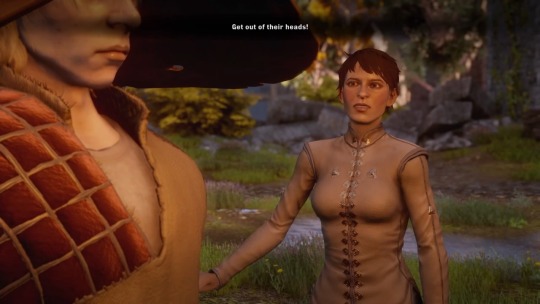
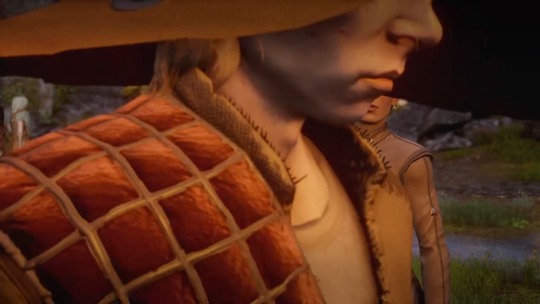
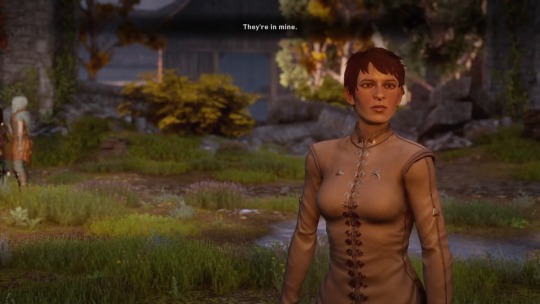
I've never picked this dialogue before because it's a little aggro, but lol.
2 notes
·
View notes
Text
Hypothetical Cole cameos in DA4, ranked:
Maryden Halewell is playing in a cafe in Antiva, and has a line of dialogue about Krem/Cole/Zither/whoever her love interest is.
Mentioned in a war table mission (Or whatever the DA4 equivalent of unvoiced sidequests is. Dreadnought mission.)
Has his own codex entry, or is mentioned by name in a codex entry—the Inquisitor’s, Maryden’s, Charter’s, etc.
Codex entry about the Inquisitor’s inner circle which maintains the in-universe conceit that Cole doesn’t officially exist. “And some have reported seeing a spirit fighting at the Inquisitor’s side...”
Same as (4) but there's literally just 8 companions and he's not mentioned at all.
If Cole is more spirit: “And some have reported seeing a mysterious boy following in the footsteps of the Dread Wolf...”
--
Hey guys. It's tumblr user officecyborg writing four years later. When I saved this to my drafts in 2020, it seems that I failed to guess what is now looking to be the most terrifyingly likely option, which is that Cole shows up in-person when Solas Totally Kills Varric, resulting in a flurry of "took the kids in the divorce" jokes about a character who will be, at the time the game is set, a 32-year-old man.
6 notes
·
View notes
Text
There’s party banter where Sera says she doesn’t remember how she snuck a beehive into Cullen’s training dummy, and Iron Bull speculates that Cole helped her, and my pet theory is that this is where Cole procured the dead bee from the Leliana honey wine blunder.
2 notes
·
View notes
Text
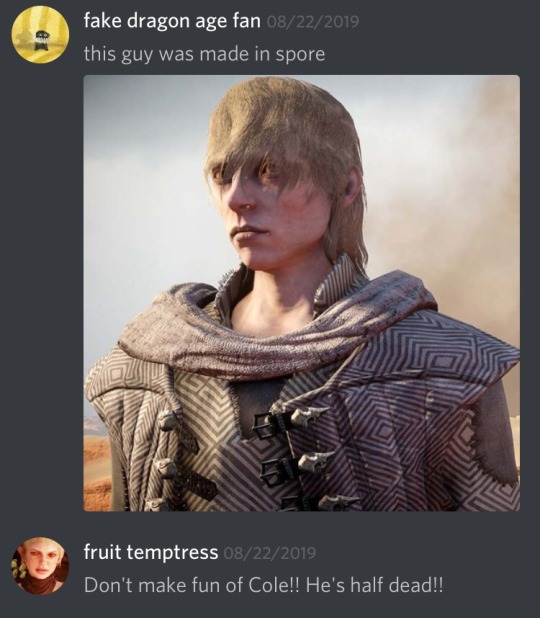
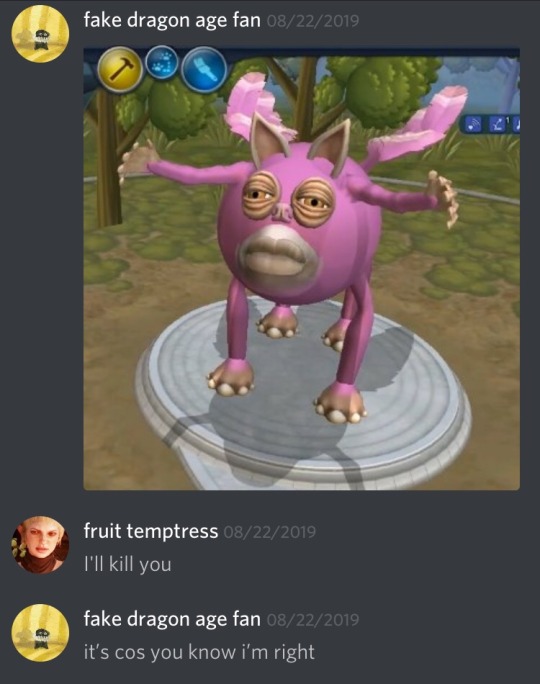
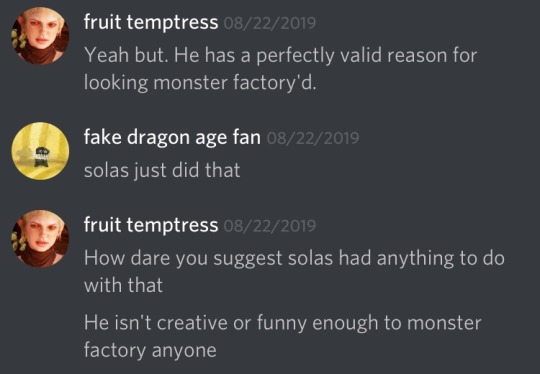
throwback fucking thursday.
7 notes
·
View notes
Text
Vyce handshake Cole:
character has multiple routes where their personality takes a drastic turn in one of two directions. on a surface level they couldn't be more different.
some players dislike the character for this reason, or just dislike this trait--it's inconsistent, how could you trust him, it makes no sense that someone's personality could be so different, etc.
among players who do like them, people often have strong feelings that one of the routes is the "real" outcome, which logically follows from their personality in the early game. there is vigorous disagreement over which route this is.
furthermore, their personality isn't something you "choose" directly (nor is it random). the way their personality ends up is a response to your actions, beliefs, and which other characters you choose to side with.
2 notes
·
View notes
Text
[disclaimer: Cole is not going to show up in Dragon Age 4. he’s already had major character spotlight in a book and a game. his story has been completely, beautifully resolved with a neat little bow. and no game dev in the world would want to devote resources to creating material for multiple world states in which his basic character is entirely different and he might be invisible—why would you go to all the trouble with writing, bringing back the VA, creating a new character model for the next-gen console, when his basic premise of “has the power to make people forget him” makes him THE single easiest character to write around?]
that said wouldn’t it be great if in DA4 Maryden had a cameo playing in a tavern in Antiva or somewhere, and if she’s in a relationship with Krem or Cole, they are sitting in a chair nearby and you can say hi :)
1 note
·
View note
Text
you know who would hate Cole and Maryden the most? Solas. like first of all because it’s a perversion of nature for a spirit to consort with a human and so on and so forth, that’s a given. but also in a very real sense because verbal sparring in iambic pentameter is HIS thing, dammit. how dare this bard steal his thing.
#da blogging#coleposting on main#‘’this is heteronormative‚’’ says solas‚ a straight man‚ to maryden‚ a bi woman
11 notes
·
View notes
Text
human Cole = “if we want the rewards of being loved, we have to submit to the mortifying ordeal of being known.”
spirit Cole = “actually, you should keep the rewards of being loved. you deserve it. I prefer the gratifying ideal of being forgotten.”
0 notes
Text
I was going to make a post about MaryCole being valid because something something the mortifying ordeal of being known, but actually they’re just valid because they’re a pair of eccentric bisexual lunatics who wander the countryside rescuing stray kittens while being the most insufferable couple alive. they complete each other’s sentences in iambic pentameter. disgusting. love them
3 notes
·
View notes
Text
the Inquisitor’s scripted cutscene reaction to Cole erasing his own memory (shock and perturbation) is the only silly thing in an otherwise lovely subplot route -_-
5 notes
·
View notes
Text
The Haunting of Blackwall
“Why doesn’t Cole tell anyone about Blackwall’s crimes, when he senses them empathically?” So glad you didn’t ask! I posted about this already but here’s the excessively detailed version, since the answer is actually quite interesting.
For starters, so we’re on the same page about what Blackwall’s crimes actually are: Cole doesn’t care that Blackwall is impersonating a Grey Warden. That doesn’t have a direct emotional effect on anyone, it’s not relevant to a Compassion spirit. I’m not even sure Cole knows what Grey Wardens are, apart from “a group of soldiers with the Blight”. He’s mostly uninterested in politics. Besides, Blackwall isn’t trying to trick anyone—he really is trying to be the character of Blackwall, and Cole can sense this (”You killed Rainier.”).
What Cole does care about (deeply!) are misdeeds like murder, killing innocent people, war crimes. Trying to cover up war crimes. That’s a big one. If Cole met someone like that, someone who wanted to be a better person while actively dodging responsibility for their past, he would probably urge them to confess.
Which he does with Blackwall. Constantly.
Blackwall is a murderer (and a war criminal, natch) who hates his past self. He puts on the aspirational persona of an ever-helpful Grey Warden because he’s terrified of slipping back into his old, murderous ways. He knows what he did was wrong, feels terrible remorse and wants to atone. you might note some similarities between Blackwall’s backstory and Cole “Ghost of the White Spire” Compassion’s backstory. Cole does, too. In fact, he points out the parallel more than once, such as here:
Blackwall: Either way, I know you're dangerous.
Cole: Yes. Like you.
Or when Blackwall questions whether they can trust a “reformed” murderer, and Cole dips into Blackwall’s own voice:
Blackwall: But you've killed before.
Cole: Yes. Before I knew what I was.
Blackwall: Why should we believe you can help now?
Cole: It hurts too much. I can't be me, have to be someone who never killed. Help enough, and I'm different. I'm not me. Believe it to become it.
Blackwall: Maker's balls.
Cole: We can change, if we want it enough.
The crucial difference, though, is that Cole is upfront about his murderous past, and Blackwall... isn’t. But Cole still wants to help Blackwall, just like he does with basically everyone on earth. The man wants to do better, but he can’t do that until he’s acknowledged his crimes. The most helpful outcome isn’t to tell on Blackwall, but for Blackwall to confess himself. At the same time, Cole was a victim of the Templars. He has Opinions about soldiers who kill children and try to cover it up, and they do not involve treating them with kid gloves.
So Cole proceeds to... kind of haunt Blackwall. He brings up his crimes frequently. Often these comments have an air of plausible deniability, but with a snide, passive-aggressive tone he doesn’t use with any of the other companions. He points out that Blackwall is hiding his identity:
Cole: So many masks.
Blackwall: At the ball? It's Orlesian culture, get used to it.
Cole: Not at the ball. Here.
And, more pointedly, that Blackwall’s beard is a disguise:
Cole: How do you get the hair on your face?
Blackwall: Look, ask Varric. He seems to have adopted you.
Cole: He doesn't have hair on his face. Is it a mask?
(In post-Revelations banter, Sera points out that the wanted sketch of Thom Rainier had “no beard,” and his blunt explanation is “Warden Blackwall had a beard.”)
When Blackwall asks how one can make people forget them--like you know, hypothetically--Cole gives him a specific mechanical answer that no human could possibly replicate, that plays up the existential terror of being forgotten:
Blackwall: Tell me, Cole, how do you make them forget you?
Cole: I'm not really real. They already want to forget me. I find the part that doesn't fit and set it free. Their mind makes a shape that makes sense without me.
Blackwall: That's not right.
(If you’re wondering whether Cole just didn’t pick up on the subtext, contrast the way he responds to Solas wishing he was a spirit—“You don’t have to be jealous of me.” Cole exclusively picks up on the subtext. He knows what Blackwall is really asking here.)
He alludes to Blackwall not being a real Grey Warden:
Blackwall: How does a spirit become flesh anyway?
Cole: I don't know. How does a Warden become Grey?
(This is very ambiguous; there’s the literal fact that Cole became Cole after he couldn’t prevent the original’s death, personally I read the implied answer as “because I believe I’m what I am, just like you”.)
Finally there’s this gem, where Cole starts singing the song Callier’s children were singing, and Blackwall is deeply disturbed:
Cole: Mockingbird, mockingbird, quiet and still, what do you see from the top of that hill? Can you see up? Can you see down?
Blackwall: Wait.
Cole: ...Can you see the dead things all about town?
Blackwall: How do you know that song?
Cole: It just came to me. Everyone says everyone knows it. The children knew it.
What’s really striking to me here is Cole’s explanation of where he heard the song. Obviously, he heard it in Blackwall’s memories. But when Cole senses someone’s thoughts, he usually just... says so. “Everyone knows it”? That’s so vague and un-Cole-like. “Gee, I don’t know, Blackwall. it’s a popular song, isn’t it? I could’ve picked it up from anyone.” It’s such a blatant conversational dodge... except, just when Blackwall thinks it might be a coincidence, Cole does bring up the children. It’s hard not to read that as deliberate, calculated needling: “Yes, I know, and you know I know. Was there something you wanted to say?”
But again, his goal here isn’t to expose Blackwall, it’s to encourage him to do the right thing and confess. And maybe it even works, or at least contributes. After all, you only find out Blackwall’s crimes after he turns himself in. Cole isn’t bringing this stuff up innocently/accidentally, nor is he just messing with Blackwall or “playing dumb”. He knows the significance of Blackwall’s crimes, since they’re so similar to both his own crimes and the one that killed him (which is also why he’s a liiittle sardonic about it). There’s no point narcing to the Inquisitor, because “everyone hides dead things.” That’s why Cole takes the approach he does with Blackwall. While also backsassing him, like, 24/7.
15 notes
·
View notes
Text
Like I’ve seen the sentiment expressed a few times, “why didn’t Cole narc on Blackwall and Solas to the Inquisitor, if he mind-read their secrets?” And my first instinct (apart from “because it would break the plot”) was that both of those secrets—not being a Grey Warden/being an Elven God—are things you could ‘know’ without recognizing their social/historical/political significance to others (since Cole barely knows any lore). But the more I think about it, like... the two dynamics could hardly be more different
With Blackwall, Cole is constantly trying to push him into confessing, hinting that he Knows in ways only Blackwall could pick up on, casually dropping Blackwall’s real name into conversation, and just generally being a bit snide and passive-aggressive in a way he isn’t with other companions because Blackwall is not owning up to being a murderer (since, you know, that’s Cole’s backstory too, as both murderer and victim). And I think he kind of explains why he doesn’t tattle in their post-Revelations banter—he wanted to let Blackwall do the right thing (“You never hid from me.”). Blackwall is trying to work up the willpower to turn himself in for probable execution, Cole knows this even if he does not like him particularly. So he’s fully aware that Blackwall has done terrible things, but the way to “help” here is not to tell on him, but to harshly remind him of his conscience when he’s getting too comfortable.
Whereas with Solas, it’s quite the opposite: Cole has no reason to believe that Solas has done anything wrong, thanks to a very different emotional profile and a soupçon of outright manipulation. Apart from the aspect of “Solas is not literally a deity or a wolf,” so without context, the most you could get from Solas’s memories is “he’s really really old,” the character of those memories is completely different. Blackwall is torn up by guilt; Solas has regrets (such deep and shiny regrets for an empath to pick at!), but ultimately sees his past as heroic and the right thing to have done. He and Cole discuss this stuff openly in front of the party. If Cole ever does discuss something that’s too inconvenient for other people to know (like the eluvian conversation) then Solas shields his thoughts from him (“Ah! Where did it go?”).
And related to the thought-shielding point: you have to account for Solas’s knowledge of how to interact with spirits here, too. Solas likes spirits, but he doesn’t anthropomorphize them—they’re his “friends,” but he doesn’t actually see them as people, he sees them as concepts. So on the one hand spirits like him because they’re drawn to his depth of memory and general even-tempered-ness, and on the other, he goes out of his way to butter them up by appealing to their nature. Cole is no exception. Solas showers him with praise and gratitude, inquires after his Helpful Works, talks about the value and rarity of compassion, and encourages Cole to mirror Solas’s own thoughts back to him. Which I don’t totally love, since Cole isn’t just a spirit, he’s also a person, and his loyalty to Solas is also sort of replacing his dynamic with his former friend Rhys. He’s a compassion spirit who latches onto anguished souls and a socially isolated, autistic 22-year-old who feels most at ease around older male authority figures who give him clear instructions on how to behave. So, again, that ends up coming off as manipulative and a little sinister to me. (Even though I don’t think Solas would care or necessarily consider it possible to “manipulate” spirits.)
The upshot is that Cole sort of sees them as being “friends” (in the usual sense) and trusts Solas completely, whereas Solas sees them as “friends” (in the spirit follower sense), and is quite careful about what he lets Cole know or say. Then the minute Solas thinks Cole might become a liability because he’s out of his sight, Solas wipes Cole’s memory so he can’t tell anyone. :/
#say one thing for human cole > spirit cole he never thinks about solas again!#da blogging#coleposting on main#like to be clear I do think solas considers cole his friend to the extent that he considers anyone his friend#I don't think that's something you could fake or fool an empath with#but he's quite clear that he sees spirits as pure embodiments of concepts and not people and that is very clear in how he uses them
6 notes
·
View notes
Text
holy moly, my sister brought Cole to the fight with Corypheus and there’s special dialogue where Corypheus tries to bind your “demon” and Cole fights back with the extremely raw line “I am no demon, and you are no god!” his epilogue dialogue changes too. holdover from the planned betrayal cutscene, I’d think.
Sera’s epilogue dialogue was also wildly different with a faithful inquisitor, she starts musing on whether this was “Her will, or, you know, His will”. honestly didn’t see much of her Andrastean stuff and I romanced her
3 notes
·
View notes
Text
oh I’m so genius. I always interpreted Cole’s reaction to everyone seeing him in the restaurant scene as a little negative. if you say “I’m proud of you for letting them see you” he responds in a quietly shocked sort of way, “...I don’t think I did.” which I read as like, he doesn’t want them to see him! and now he doesn’t have the choice, because his powers are gone.
except... Cole totally does want people to see him. that’s his character goal from page 1 of Asunder. it’s practically the first thing we learn about him. he’s invisible, he hates it. he’s so desperate for someone to notice him he will do just about anything to stop being invisible, from murder to fighting an archdemon. when they say the punishment for his crimes is going to be making him Tranquil, he’s okay with it, because at least if he’s Tranquil he won’t be invisible. like, he comes to accept that his powers are useful, and then he finds out he’s a spirit and leans in to that part of his nature instead. but that desire probably never went away. it’s one of those “you can’t have the benefits of being a person and not being one at the same time” things. so he’s probably like, pleasantly surprised they can see him, he just never even realized it was an option. it’s a direct parallel to realizing he can hear everyone’s thoughts in the spirit version of the scene. I am. so genius. 🤦🏻♀️
4 notes
·
View notes
Text
look I’m not saying the really common “Cole and Anders would be BFFs” concept could never happen. I’m just saying any conversation between them about DA2 would have to start with explaining what a Chantry is and why someone would want to blow one up
2 notes
·
View notes